Welcome to the World of Influencers
From vintage fashion icons to travel bloggers, niche chefs to fitness experts, Influencers across the globe are now part of the lifeblood of internet and social media. Collectively they now have a very significant impact on commercial trends, product sales and even into the political and cultural arena. Collectively they cover every conceivable niche area across fashion, gaming, cooking, travel, cosmetics and fitness – as well as a dizzying array of nano-niches.
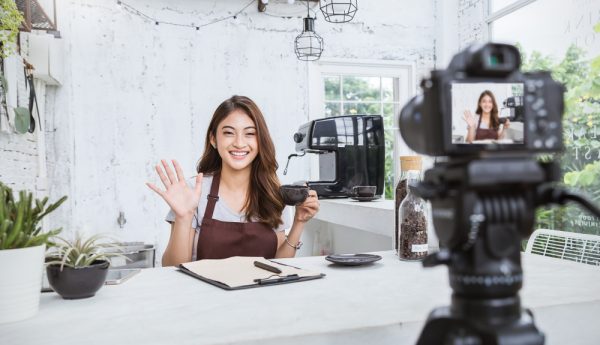
Influencer marketing and its impact becomes even more pronounced given the continuing disengagement of young people from more traditional print and broadcast media in favour of online and social media platforms – on which influencers have an extremely strong impact.
However, whilst there’s no doubt Influencers present huge opportunities for brands, it’s really important that businesses build up strong knowledge and a commercial savviness on working with them.
As the following guide shows – the world of Influencers is a mix of the creative and complex, where serious creative professionals vie for attention against third-rate hucksters.
In my guide below, I’ll cover some of the fundamental areas of the modern Influencer environment including:
- Growth and Importance of Influencer Marketing
- Types of Influencers
- Working with Influencers
- Types of Influencer Content and Activity
- Working with Influencer Agencies
- Influencers and Advertising Guidelines
Defining Influencers:
In many ways the term ‘Influencer’ covers such a hugely diverse cross section of people that it renders the term almost meaningless.
As Wired Magazine states : “
“It is simultaneously both an insult and an aspiration, The scourge of small business owners and the future of marketing, and a monkier for teenage kids with middling social media followings, and mega celebrities alike.”
But as overall simplified definition:
An Influencer is a ‘content creator who has built up a following across social media based around a particular theme. Influencers have the power to impact on buying habits and attitudes of others by creating and publishing content, which is often sponsored, to social media platforms such as Instagram Facebook and TikTok. They often work with brands and businesses by featuring their products and return for free samples or money.”
It’s important to remember that even though somebody might have a huge amount of influence, for instance a sports star or actress, they might not necessarily be an ‘Influencer’ in the context we are dealing with here. When we talk with influencers, we really mean somebody who has created a public persona, a following and steady professional content around a niche area of expertise.

Growth and Importance of Influencer Marketing
Already a hugely important and growing part of Internet culture, government imposed lockdowns across the globe acted as a catalyst for Influencer power and popularity.
And it’s not surprising to see why. Over the past twenty years, consumers have grown more suspect and immune to corporate messaging. In tandem with this trend has been the increase in people following and consuming content from Influencers due to:
- Affinity: Influencer fans believe they have a much closer relatability to them compared to faceless corporate brands.
- Distinctive: Influencer content often appears as fresh, fun and attractive compared to branded content
- Credible: As Influencers are often dedicated to a niche area, they are often seen as expert and believable (speaking broadly here – as there’s so many Influencers who aren’t credible!)
Now the explosion in Influencer popularity has massively increased the opportunities for:
- Niche and celebrity influencers to build up powerful fan bases – particularly on social media
- Brands and businesses to work with relevant influencers to positively promote their products or campaigns.
And the Influencer economy is huge! According to Statista, the global Influencer economy grew massively in 2020 – to $9.7 Billion, and is projected to increase to $13.8 Billion in 2021.
Types of Influencers
Given the size and complexity of the Influencer economy, Influencers span a huge range of areas:
- Mega / Celebrity Influencers
Also known as mega influencers, celebrity influencers have huge levels of followings gained from their very dominant positions in areas such as sport, fashion, music and media. Think Harry Styles, Emma Watson and Cara Delevingne.
Individuals in this category will typically have followings of over 1 million people on each of their social media profiles and charge fees of over £200,000 to work with them on content.
- Macro influencers
Individuals in this group typically have between 100,000 to 1 million+ followers and are much more likely to have gained her influence through their creative content and expert status on areas such as fashion, fitness , travel, food , grooming , lifestyle. Leading names in the UK include – Susie Bubble a leading street style fashion blogger, and Dina Torkia – a British fashion blogger, vlogger and top UK influencer who’s worked with the likes of Liberty of London
- Micro influencer
Micro influencers are likely to be the most significant for smaller businesses organisations as they tend to have a much more engaged following. With typical followings are between 1000 and 100,000 people, Micro influencers tend to produce content that is much more relevant and focused on their follower needs. This makes them a very good option for small brands or businesses that want to work with an influencer with a strong relevance and highly engaged audience.
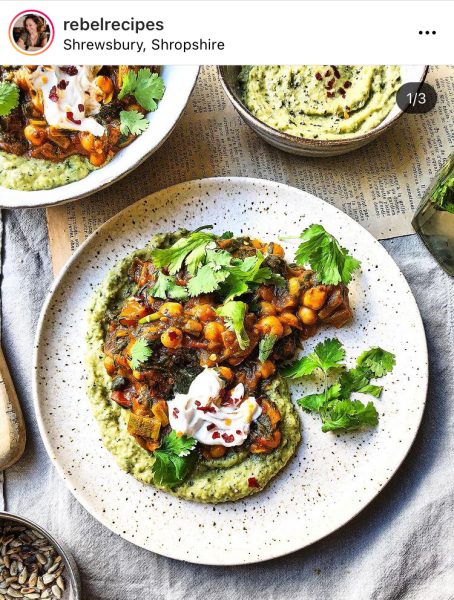
Understanding the Influencer Backlash
There is no doubting the recent backlash against the culture of influencers. For many people influencers come across as vain, self-centred and vacuous.
Part of the backlash has been motivated by a reaction to some influencers earning very large sums of money for their sponsored activity, but in many cases their negative reputation is due to many influencers displaying grandiose and entitled attitudes.
Some influencers have certainly been guilty of displaying a tone-deaf approach to the coronavirus pandemic. Perhaps the best example was the car-crash video by Gal Gadot during which the actress performed a cringeworthy rendition of John Lennon’s Imagine , whilst trying to ‘comfort’ people telling them , “ it’s easy if you try”.
There is also no doubt that at least some of the attacks on Influencers are motivated by the nastiness of online trolls who just want to attack people who promote themselves online. ‘Haters Going to Hate’ as the saying goes !!

Working with Influencers
While it may be tempting for businesses to dive in and start working with influencers, the overall environment is a complex one. There’s been much controversy in the media surrounding the prevalence of fake influencers who have artificially inflated their followings and ripping off businesses.
Brands also need to be aware of how influencers work, how to properly approach them and how to manage commercial agreements.
To avoid making the wrong approach to influencers or even alienating them, it’s important brands understand what influencers do and how they typically work with business:
Niche Focussed: One of the main traits of an influencer is their niche expert focus on a particular area – from vintage fashion to share trading for beginners.
Credibility: They have developed their own brand and are protective of it. Successful and quality focused influencers have thought hard about the tone and consistency of their content. They produce content that’s important and valuable to their followers and will quite often devote a significant amount of time to developing content from initial idea through to setting up the post , image or story set up, to post production editing.
Relevant: Respected and professional Instagramers want to work with companies that reinforce their own brand values and reflect a relevance to what they do. So the very first step a company or influencer agency should take is to review the Influencer’s content and themes to check for relevancy and compatibility.
Offering Value: Many Influencers charge fees that bear little reality to the marketing value that they claim to have. As a business you need to be careful to avoid paying high rates to Influencers with little return for your advertising spend. This is particularly the case for small and micro businesses who may pay considerable amounts of money for sponsored posts that have very limited impact on their brand awareness or sales.
Don’t ask for a white wash: Sponsoring a respected influencer and expecting them to post a puff piece about your poor product or service is likely to backfire badly with some influencers !
Just as a respected magazine or feature journalist might turn sour on you for trying to buy them off with a poor product or experience, so might an influencer who feels their brand integrity would be damaged by producing a positive piece following an unpleasant experience.
The baroque town of Noto in Sicily recently encountered a PR fail after courting and sponsoring Selvaggia Lucarelli , a well-known journalist and influencer. While the intention of the Noto Mayor may have been to gain favourable publicity – a combination of power cuts and refuge problems – caused the journalist to expose them publicly through a series of highly negative posts and videos.

Influencer Content and Activity
If you’re serious about working with Influencers, you’ll need to be familiar with the most relevant figures within your niche area – who they are, their content and how they work with businesses on sponsored content.
Let’s take a look at a few Influencers as examples:
On The Sauce Again – Inka Larissa
Inka is a Blogger / Influencer specialising in writing about Spirits with a strong emphasis on Whiskey, Gin and Tequila, and the force behind On The Sauce Again. She focusses strongly on spirits, delving into their unique backstories, recommending glassware as well as tips and tricks for hosting parties and drink-related travel guides.
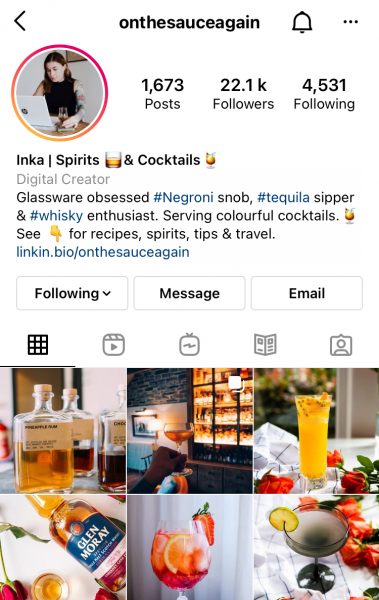
A quick look at Inka’s content opens up a world of beautifully presented spirt reviews, product profiles, cocktail recipes and distillery visits. Looking through the posts and stories on Instagram, it’s clear there’s a lot of planning, care and knowledge and experience invested in her work and content.
It’s not surprising that independent / niche spirt brands would want to work with Inka to profile their products. To them it’s a great way to reach a niche and highly engaged audiences of spirit and cocktail fans in a fresh and creative way. It also gives them a credibility stamp to be associated and recommended by a niche expert.
Niki Webster is the force behind Rebel Recipes – a Plant-based Chef and Author.
Since 2015, Niki has operated the Rebel Recipes site and blogged online about vegetarian food, recipes and lifestyle. In the process she’s gained a very loyal and engaged community and audiences across the globe. According to Niki, “My recipes are a celebration of vegetables, they are at the heart of all my dishes, and I build recipes around them. I believe that plant-based food doesn’t need to be ordinary, you just need a little creativity and your meals can be bursting with unexpected flavour whilst still being healthy and uncomplicated.”
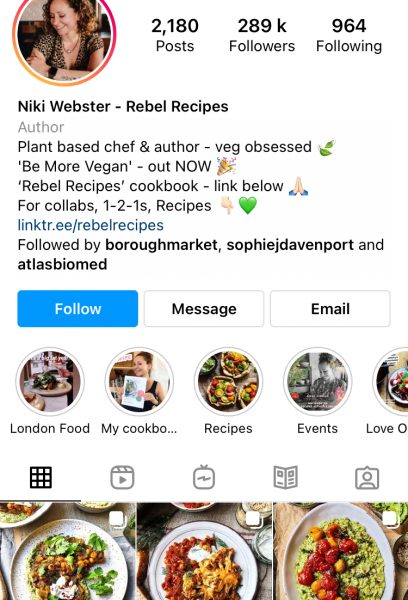
Looking through her content it’s easy to see why Niki has succeeded in building such a following – over 289,000 followers on Instagram – as well as a host of other social media accounts, website and even a Podcast.
Beautifully prepared and shot photos of her culinary creations, sit neatly beside sponsored product posts on brands such as Kallo, full recipes and guest interviews.
Niki is also very clear on how she works with brands and her services providing a dedicated ‘Work With Me’ section on her website covering Sponsored Posts, Food Photography and Workshops.
Again, brands should take note of how ethical Influencers are protective of their brand – and won’t just work with anyone. As Niki states “I’m very lucky to get lots of enquires and collaboration requests. However I can only work with brands which fit my ethos.”
Due Diligence on Influencers – why it matters!
In my guide, I’ve mostly focussed on professional, ethical influencers. However, there’s a truly huge amount of fake and highly disreputable Influencers – who have often massively inflated their level of impact or actually even bought fake followings online (easy to do for a very low cost)
So many small businesses are approached by a legion of fake influencers (probably once a week if you run a hospitality business.) , seeking freebees and discounts.
With breath-taking over-confidence, this type of Influencer will push a slick sales line with naive business owners in an effort to gain free goods – all the time in the knowledge that their 100,000+ followers are fake bots bought from Like farms.
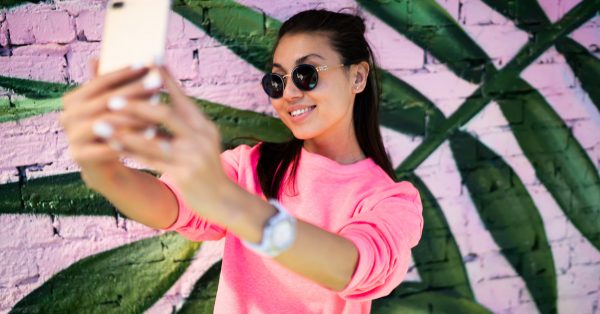
I’ll be very clear in saying this is a form of business fraud that’s been allowed to go unchallenged for too long.
If you want a great introduction to how these people work – them check out this fantastic video by Paul Stenson: https://youtu.be/72yYW6beTQk
As usual, it’s the smaller micro businesses owners who get burned the most by these hucksters. However, even more seasoned businesses with marketing units do need to perform some due diligence. So what do businesses need to do to ensure they get to work with the right influencers?
Ask For a Media Pack:
Reputable Influencers should be able to provide you with a Media Pack that summarises their audience and their engagement levels. Engagement is a very importance area to focus on as you’ll want to see evidence of how relevant and impactful their content is with their fans in the form of post likes, comments and shares. To provide an added layer of trust, they should be able to show you evidence of how they have gained their followers.
Review Their Content:
It sounds basic, but you need to look through their content and assess the quality, professionalism and presentation of their content. In particular, review in detail how they have delivered Sponsored Content for other brands. Is it a creative and attractive photo that stands out really well? How have they introduced the products and brand? Have they talked about the product in a way that comes across as attractive and authentic?
As a good comparison – just a look at the sponsored posts and content by Niki Webster / Rebel Recipes or Inka Larissa / On The Sauce Again as two benchmarks on what brands should expect from sponsored content.
For more guidance on how to spot fake Influencers: https://sproutsocial.com/insights/fake-influencers/
Working with Influencer Agencies
As we’ve seen, the Influencer environment is a varied, constantly changing and complex one!
If you want to benefit from Influencer marketing, then you could work with a reputable Influencer Agency who can help:
- Source: Quickly and authoritatively suggest Influencers who are relevant to your brand and campaign
- Offer Creativity: Use their experience to develop creative ideas on how to utilise the right influencers for your campaign
- Save Time: Working with an Influencer Agency will undoubtedly save time from having to make approaches to individual influencers who may not want to work with you.
- Reduce Risk: Professional Influencer Agencies will have taken care to check out their Influencer base in detail and screen out potential or blatantly fake influencers
Influencers and Advertising Guidelines
If you’re working with Influencers, or Influencer Agencies, you’ll need to know about and abide by relevant advertising codes.
In the UK, The Advertising Standards Agency has worked with the wider Advertising industry to develop The CAP Code – which is enforced by the ASA, contains rules about how ads should be recognisable as ads, and sets out rules that advertisers must follow to avoid misleading people.
There are a number of areas that are applicable when brands work with Influencers, most importantly:
“ ‘unfair commercial practices’, including using ‘editorial content in the media to promote a product where a trader has paid for the promotion without making that clear in the content or by images or sounds clearly identifiable by the consumer (advertorial)’ against the law.”
“When a brand gives an influencer a ‘payment’ (i.e. any form of monetary payment, free loan of a product/service, any incentive and/or commission or a product/service has been given free), any resulting posts promoting the brand become subject to consumer protection law enforced by the Competition and Markets Authority (CMA). When a brand also has editorial control over the content, the ASA can apply the CAP Code as well.
Final Thoughts
The Influencer economy has grown massively and offers a real opportunity to brands to reach and influence audiences in ways that can quickly add credibility on popular social media platforms.
As with any popular form of marketing there will always be disreputable people – ranging from the dishonest to the outright scammers – keen to part businesses from their money, for very little return.
But by building your knowledge on how Influencers work and on how you can develop relationships, you’ll be a lot more confident and better positioned to gain positive exposure with the right Influencers for your brand.
Paul McGarrity
Director
Octave Digital

